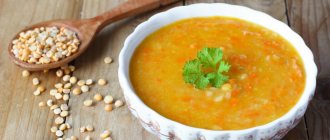Chicken eggs contain many substances that are beneficial for children.
Every mother wants the best for her baby. And, of course, a mother who is starting complementary feeding is very concerned about the safety of a particular product. Eggs are not the easiest choice for your digestive and immune systems, but they do contain nutrients that are hard to find substitutes for.
Is it possible to give chicken eggs to a child? In the absence of allergies, of course, yes. But the age at which they are added to the children's diet is important.
Benefit of the ingredient
- Eggs provide children with the necessary protein of animal origin with a complete composition of amino acids. They play an important role in the formation of tissues in the young body of a toddler;
- Egg yolk is an irreplaceable source of fat-soluble vitamins. Without it, the baby’s body growth is disrupted and the baby’s various systems malfunction;
- the yolks also contain a variety of minerals, with the help of which the baby’s skin remains healthy, his immune and nervous systems function normally;
- eggs are included in dietary products with low calorie content, so they are included in the diet of children of different weights, and they can be consumed at any time.
Chicken or quail eggs: which is better?
Nowadays, you can easily buy not only chicken eggs, but also quail eggs. Moreover, the value of the latter, despite their small size, is much higher. They are superior in the amount of nutrients. For example, five quail eggs, which weigh the same as one chicken, contain 4.5 times more iron, 5 times more potassium, and 2.5 times more B vitamins. However, chicken eggs are less caloric than quail eggs, they are lower in various fats and cholesterol. This means that the load on the baby’s liver and developing digestive system is less. In addition, quails lack vitamin D, which is important for baby growth.
Quails are not susceptible to salmonellosis and are not given antibiotics. Quail eggs are less allergenic and almost do not cause diathesis in infants, so many pediatricians recommend starting complementary feeding with them.
It is recommended to alternate chicken and quail eggs, as their composition differs.
Harm and contraindications
Previously, eggs were considered a very harmful food product because it contains cholesterol. They were accused of diseases of the cardiovascular system; it was argued that their use in food causes an increase in cholesterol, which in turn clogs the blood vessels.
At the moment, after a huge number of studies, it has been established that the cholesterol in this product does not have a negative effect on human health.
On the contrary, unsaturated acids and lecithin, which eggs contain, significantly reduce the triglyceride amount.
How to choose
Experts say that the beneficial properties of the product do not depend on the shade of the shell. Freshness plays a big role. When purchasing, it is important to pay attention to the release date. Children are not recommended to buy food that is nearing its expiration date.
Eggs with cracked shells pose a health hazard. An infectious agent can penetrate through the damage. They also shouldn't be too clean. If they were washed the day before, the shelf life is significantly reduced.
You should not buy the product in dubious places. It is recommended to avoid purchasing from private sellers.
To check the freshness, the egg can be placed in a container filled with cold water: a good one should sink to the bottom.
Which is more allergic?
Protein molecules show a higher allergenicity; there are a lot of them in egg white, so protein is much more likely to provoke allergies. But the baby’s body can respond extremely negatively to the yolk, although this rarely happens.
In addition, during the cooking process it is very difficult to completely separate the egg yolk from the white, therefore, if the baby is allergic to eggs, then you should not give the child the yolk separately.
At what age can egg whites be introduced into the diet?
We don’t really like yolk, and we also suffer from allergies. And I’ve heard about whites since I was 3 years old. There’s even an article. But we all give it my way!
Chicken eggs: properties and usefulness Posted by admin on Sun, 05/23/2010 — 10:48 allergy protein health chicken eggs body nutrition egg What could be more banal than scrambled eggs for breakfast or a hard-boiled egg. What do we even know about chicken eggs? Chicken eggs are a valuable product that has many antigenic properties. In some people, eggs can cause allergies. The most allergenic part of an egg is the white. It should be noted that infants, about six months old, can already be given yolk (the main thing is that there is no reaction to it), but white no earlier than three years. Why after three years? The answer is simple: all because by the age of three, a child’s gastrointestinal tract becomes more mature, prepared for eating chicken egg whites. Egg white is considered the best protein in the world - it is better than meat, dairy products, and fish. Chicken protein is absorbed very well, almost 97%. It is especially recommended for use by patients with skin diseases and chronic dermatoses, because no waste is formed after it. In this regard, eggs are an ideally digestible product if the white is boiled. After all, the easier it is to digest a food product, the better. With raw protein, absorption is very poor. Crude chicken egg white contains a trypsin inhibitor (antitryptase). Trypsin is an enzyme secreted by the pancreas that breaks down proteins. Trypsin is capable of converting inactive pancreatic enzymes into active ones, thanks to which it occupies a key step in the digestive enzyme system. Raw egg whites from chicken eggs are also used in folk medicine to treat peptic ulcers, increased gastric acidity and even chronic pancreatitis. Raw egg whites contain avidin. Avidin is a glycopeptide that is formed with biotin, resulting in a biologically inactive complex. An increased intake of avidin taken from food can develop biotin deficiency. Especially biotin is a very important component for diabetics, because it plays a huge role in glucose metabolism and serves as a vitamin for the good condition of skin, nails and hair. Chicken egg white is a strong allergen that can cause sensitization. SENSIBILIZATION is hypersensitivity of the gastrointestinal tract to a given allergen, which can subsequently cause a serious allergic reaction. If you do not have a food allergy to chicken eggs, then you can and should eat them. Egg white is considered the most effective muscle building material, especially suitable for athletes who want to increase muscle growth. And it is especially useful for teenagers during a period of active growth. Let's summarize about chicken eggs from the above: 1) antigenic properties; 2) protein is a valuable product; 3) content of trypsin and avidin; 4) sensitization; 5) egg white - material for building muscle mass.
How to include crumbs in your diet
All parents think about how to introduce an egg, but it is very simple. The first time, break off a small piece of hard-boiled yolk, then knead it and add it to a small amount of milk or mixture.
If the baby’s body easily accepts the new product, then after a while, the mashed yolk can be added to the vegetable puree. A child should include an egg on the menu no more than twice a week per year.
Eggs for children: how long to cook?
Chicken eggs for children are boiled for at least 9 minutes, quail eggs - 3.
With shorter heat treatment, there is a risk of developing salmonellosis. Cooking for too long spoils the taste and reduces the nutritional value. According to research, cooking for more than 15-20 minutes leads to a reduction in the amount of vitamins and amino acids.
To reduce the risk of infection, it is important to rinse raw eggs thoroughly in warm water before cooking.
Soft-boiled product is contraindicated in children!
Pediatricians allow the inclusion of fried eggs in the menu for children over 7 years old. It is important to pay attention to the degree of freshness. A dish made from old eggs can harm a child's body.
Summary
So, finding out at what age a child can be given eggs, we came to the conclusion that it is advisable to start introducing them into complementary foods no earlier than 6 months if the baby is on breastfeeding, and a month and a half earlier if he is on artificial nutrition. The specific timing of when to give depends on the baby’s health condition. If he urgently needs additional vitamins for a balanced diet, then the dates can be shifted.
Eggs are introduced into the baby’s diet, observing all the required complementary feeding rules, and checking the baby for an allergic reaction.
No matter how many months or years you serve eggs to your children, the product should only be boiled or fried, that is, undergo heat treatment.
When to give an egg to a baby
When should you give an egg to a baby so as not to deprive its growing body of essential nutrients and at the same time not harm its health?
Pediatricians recommend trying to introduce only the yolks of boiled chicken eggs into the complementary feeding of a baby in the first year of life, since the use of protein for children of this age category is prohibited due to its strong allergenic ability. This can be done starting from seven months of age and with a very small portion. In order to feed the baby the yolk of an egg for the first time, you should separate its small part, about a sixteenth, and dilute it to a puree with the main food, be it breast milk or baby formula. Boiled water will do. A portion of half a teaspoon can be given to the baby and carefully monitor the subsequent reaction. If manifestations of allergies in the form of redness of the skin, diarrhea or swelling and rash do not occur within 24 hours, then the product is harmless to it.
Within a week, the amount of serving can be gradually increased to half the yolk and added in this quantity to the child’s diet until he reaches one year of age.
Not the best quality product
Egg yolk, despite many benefits, has not only beneficial properties. Namely:
- The product is not recommended for use by children who have problems with the bile ducts.
- Allergic reactions are possible. And the most unpleasant thing is that symptoms may appear only the next day. Therefore, before giving a new product to a child, it is necessary to evaluate the reaction over the following days. Start introducing complementary foods with a very small amount.
- Never offer your child raw yolk. Eggs must be heat-treated. This is especially true for casseroles, cheesecakes and other dishes. The raw product is poorly digested by the stomach and can cause infection.
- The yolk has a high calorie content. Therefore, it can seriously harm children who gain excess weight.
Otherwise, food based on eggs will not cause serious harm to the baby.
Useful properties of yolk
Egg white is a strong allergen for infants, while the benefits of the yolk have been repeatedly proven. This can be explained by the fact that it contains many useful minerals and trace elements, such as:
- groups of vitamins A, B and D;
- folic acid, iodine and phosphorus;
- potassium, zinc, iron, manganese;
- biotin and carotene;
- amino acids.
Moreover, to enrich the body of a small child with these substances, a small portion of egg yolk is enough. It also helps the proper development of the baby’s nervous system, vision formation, and normalizes the functioning of the thyroid gland.
Western and domestic research
At Washington University in St. Louis, Professor Laura Yannotti and other scientists conducted an experiment in which 162 babies aged 6 to 9 months participated. One half of the children included eggs in their diet for six months, while the other half were fed by their parents as usual.
The results were quite unexpected: 48% of children from the first group significantly accelerated in physical development , ahead of their peers.
There is also enough research in the domestic scientific segment. For example, not long ago Roskontrol conducted an inspection of C1 category chicken eggs from several popular brands, including: “New Mark”, “Varaksino”, “Okskoe”, “Volzhskoe Utro”, “Leto”.
The main inspection criteria were:
- compliance with safety requirements;
- lack of medications;
- compliance with GOST 31654-2012 for physical, chemical and organoleptic indicators;
- validity of the label and compliance with the specified category;
- The height of the air chamber is one of the main indicators of egg freshness; the smaller it is, the better.
The results of the study turned out to be good: all samples corresponded to the specified categories, the eggs of the specified brands are completely safe, they do not contain any antibiotics, antimicrobial and antiparasitic substances , the addition of which some manufacturers do not disdain.











